- Home
- »
- Advanced Interior Materials
- »
-
Geopipes Market Size And Share, Industry Report, 2030GVR Report cover
![Geopipes Market Size, Share & Trends Report]()
Geopipes Market (2025 - 2030) Size, Share & Trends Analysis Report By Product (High Density Polyethylene (HDPE), Polyvinyl Chloride (PVC)), By Application (Drainage And Sewer, Irrigation And Agriculture), By Region (Asia Pacific, MEA), And Segment Forecasts
- Report ID: GVR-4-68040-530-6
- Number of Report Pages: 101
- Format: PDF
- Historical Range: 2018 - 2024
- Forecast Period: 2025 - 2030
- Industry: Advanced Materials
- Report Summary
- Table of Contents
- Interactive Charts
- Methodology
- Download FREE Sample
-
Download Sample Report
Geopipes Market Size & Trends
The global geopipes market size was estimated at USD 2.21 billion in 2024 and is expected to grow at a CAGR of 9.6% from 2025 to 2030, driven by the growing demand for sustainable infrastructure solutions, particularly in the construction and civil engineering sectors. Geopipes, made from environmentally friendly and durable materials, offer a sustainable alternative to traditional piping systems. As governments and organizations around the world focus on reducing carbon emissions and promoting eco-friendly construction practices, the adoption of geopipes is gaining momentum. These pipes are not only more durable and resistant to corrosion but also provide long-term cost savings due to their low maintenance requirements. As a result, industries are increasingly turning to geopipes to meet both environmental and operational goals.
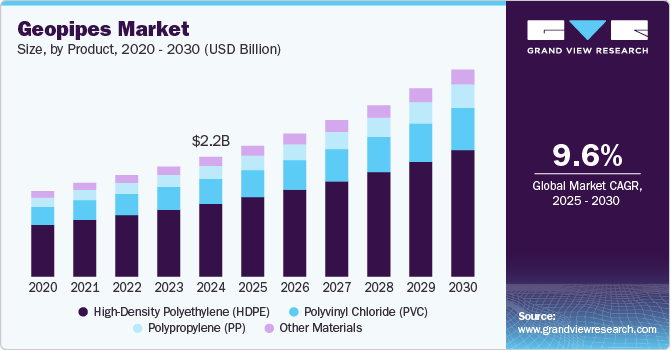
The advancement of construction technologies and innovations in materials is also propelling the growth of the geopipes industry. Modern construction techniques, such as trenchless technology, have made it easier and more efficient to install geopipes without extensive digging, reducing labor costs and disruptions. This has made geopipes an increasingly attractive option for both new construction projects and the renovation of existing infrastructure. As these technologies continue to evolve, the versatility and cost-effectiveness of geopipes are expected to further enhance their adoption across various sectors, including municipal infrastructure, Irrigation & Agriculture facilities, and residential developments.
Rising regulations and standards for environmental protection and infrastructure durability are also playing a significant role in driving the geopipes industry. In many regions, stricter environmental regulations are being enforced, prompting industries to adopt sustainable alternatives to conventional piping systems. Geopipes, with their reduced carbon footprint and enhanced durability, meet these regulatory requirements, making them a preferred choice for governments and private sector companies alike. These regulations, coupled with growing environmental awareness, are expected to accelerate the transition towards geopipes in the coming years.
Market Concentration & Characteristics
The global geopipes market exhibits a moderate to a high degree of innovation, driven by the increasing demand for sustainable and eco-friendly solutions in infrastructure projects. Geopipes, made from advanced composite materials, are being developed with improved durability, corrosion resistance, and ease of installation, making them a preferred choice for various applications in industries such as water management, gas Road & Highway Construction, and sewage systems. Companies in this market are constantly innovating to improve the performance of geopipes, introducing new materials and manufacturing techniques. These innovations are often aimed at reducing environmental impact, enhancing pipe lifespan, and improving the efficiency of fluid and gas Road & Highway Construction.
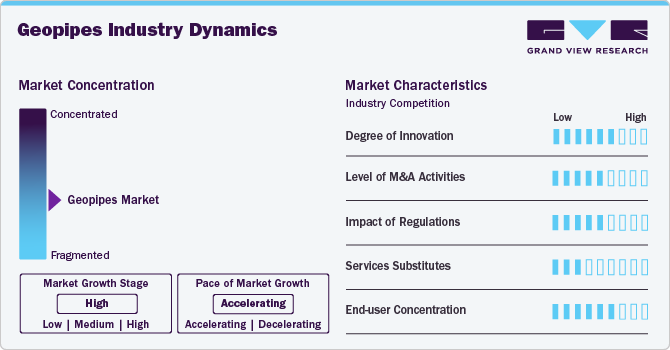
Merger and acquisition activities in the geopipes industry are relatively limited, but there is a trend towards consolidation among major manufacturers to strengthen their product portfolios and expand their geographical presence. Regulatory frameworks, particularly environmental and safety standards, have a significant impact on the market by dictating the materials and processes used in the manufacturing of geopipes. Additionally, the availability of service substitutes, such as traditional metal or plastic pipes, remains a key factor affecting the market dynamics. The end-user concentration is moderately diversified, with industries such as construction, agriculture, and utilities playing prominent roles. However, demand for geopipes is particularly concentrated in regions experiencing rapid urbanization and infrastructure development, which further drives the adoption of these advanced piping solutions.
Product Insights
The high-density polyethylene (HDPE) segment led the market and accounted for the largest revenue share of 60.69% in 2024, driven by its exceptional durability, resistance to corrosion, and cost-effectiveness in a wide range of applications. HDPE pipes are highly preferred in the construction, wastewater management, and agriculture sectors due to their strength, flexibility, and long lifespan, making them ideal for underground piping systems and infrastructure projects.
Polypropylene (PP) segment is expected to grow at the fastest CAGR of 10.2% over the forecast period, driven by the material’s superior mechanical and chemical properties, making it an ideal choice for various infrastructure and Irrigation & Agriculture applications. Polypropylene geopipes offer excellent resistance to corrosion, chemicals, and abrasion, ensuring durability in harsh environmental conditions. This has led to their widespread adoption in water distribution, wastewater management, and Irrigation & Agriculture drainage systems, where long-term performance and minimal maintenance are critical.
Application Insights
The drainage & sewer systems segment dominated the market and accounted for the largest revenue share of 38.1% in 2024, driven by increasing urbanization, infrastructure development, and the rising need for efficient wastewater management. As cities expand and populations grow, the demand for durable, corrosion-resistant, and cost-effective piping solutions for drainage and sewer systems has intensified. Geopipes, known for their lightweight nature, high chemical resistance, and long lifespan, are emerging as a preferred choice over traditional materials such as concrete and metal.
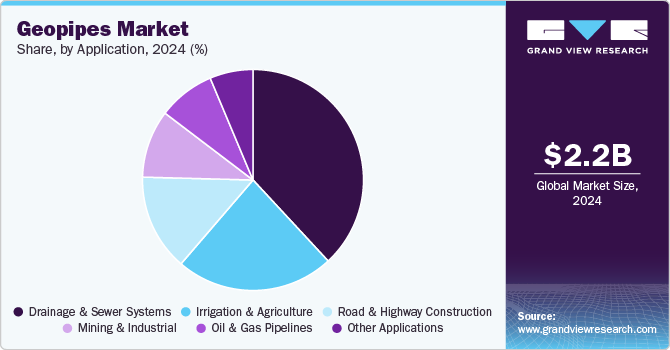
Irrigation & agriculture segment is expected to grow at the fastest CAGR of 10.1% over the forecast period. The adoption of advanced agricultural techniques, such as precision irrigation and drip irrigation, is fueling the demand for geopipes. Farmers and agribusinesses are increasingly investing in infrastructure that enhances water efficiency, reduces wastage, and improves crop yields. Geopipes play a crucial role in these systems by enabling controlled water flow, maintaining consistent pressure, and reducing the need for frequent maintenance.
Regional Insights
Asia Pacific geopipes market dominated the global market and accounted for the largest revenue share of 43.72% in 2024, driven by the rapid urbanization and infrastructure development taking place across the region. As countries like China, India, and other Southeast Asian nations experience significant growth in population and Irrigation & Agricultureization, there is an increasing demand for efficient and sustainable piping systems. Geopipes, known for their durability and environmental benefits, are gaining popularity as essential components in water management, sewage systems, and gas Road & Highway Construction networks. The need for reliable infrastructure to support urban growth and ensure environmental sustainability is boosting the demand for geopipes in these regions.
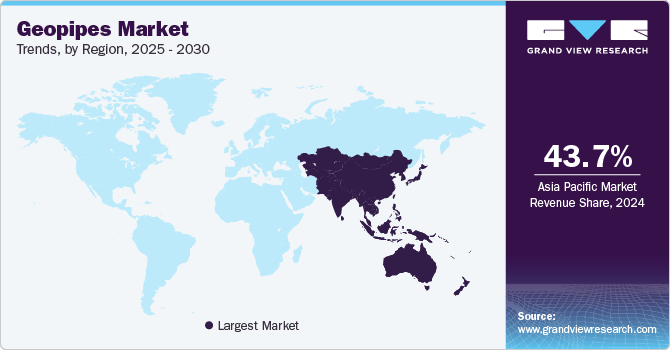
The geopipes market in China is driven by the ongoing development of smart cities across the country that further supports the demand for advanced piping solutions. Geopipes are increasingly being integrated into smart city infrastructure due to their high performance and ability to support sophisticated monitoring and maintenance systems. As the country pushes forward with digitalizing urban infrastructure, the need for modern and reliable piping systems that can handle increasing urban demands is growing, further boosting the geopipes market.
Europe Geopipes Market Trends
The European Union geopipes market has implemented stringent regulations on wastewater treatment and management, creating a significant demand for durable, high-performance piping solutions. Geopipes, with their resistance to corrosion and chemical degradation, are ideal for use in sewage and wastewater systems. These regulations are encouraging municipalities and private entities to opt for geopipes to ensure compliance with standards while maintaining the efficiency of their infrastructure. Urbanization across Europe continues to drive the demand for improved infrastructure. As cities expand, the need for efficient piping systems for water, gas, and sewage increases. Geopipes, being lightweight and durable, provide a cost-effective and long-lasting solution for these growing cities. The shift towards modern infrastructure that can withstand environmental stresses has further bolstered the market for geopipes.
The geopipes market in Germany is gaining traction in renewable energy infrastructure projects in Germany, including biogas and geothermal energy systems. Their durability and ability to withstand extreme environmental conditions make them ideal for energy transmission and fluid handling applications, where efficiency and long-term sustainability are critical. The oil and gas industry in Germany is increasingly turning to advanced materials, such as geopipes, for pipeline infrastructure. Geopipes' superior performance in harsh conditions, such as extreme temperatures and corrosive environments, makes them suitable for the Road & Highway Construction of gases and liquids in this sector, where safety and efficiency are paramount.
North America Geopipes Market Trends
The increasing focus on infrastructure renewal and replacement in the North America geopipes market is driving the regional market. Many cities across the region are dealing with aging infrastructure, particularly in terms of water and wastewater pipelines. Geopipes provide an ideal solution for these replacement projects, as they offer better resistance to corrosion and longer service life compared to traditional materials like steel or PVC. With ongoing investment in upgrading and renewing infrastructure, the demand for high-performance materials like geopipes is expected to grow steadily in the coming years.
U.S. Geopipes Market Trends
The rise of the renewable energy sector in the geopipes market of the U.S. is another factor contributing to the demand for geopipes. Geopipes are ideal for applications in renewable energy infrastructure, such as geothermal energy systems, where corrosion resistance and longevity are essential. As the U.S. continues to expand its renewable energy initiatives, geopipes are being increasingly utilized in energy-efficient systems. Their application in geothermal heat exchange systems, wind energy projects, and solar panel installations enhances the overall sustainability of these energy solutions, contributing to the wider adoption of geopipes in the energy sector. The rise of smart cities is also fueling the demand for geopipes in the U.S. Smart city projects emphasize the integration of advanced technology into urban infrastructure to enhance efficiency and sustainability.
Latin America Geopipes Market Trends
The growing focus on reducing carbon emissions and minimizing environmental impacts is driving the demand for the Latin America geopipes market. Governments and organizations are actively working towards green building certifications and sustainable construction practices. The use of geopipes aligns with these goals as they contribute to energy-efficient and environmentally friendly infrastructure. In addition to their environmental benefits, geopipes' ability to reduce long-term maintenance costs due to their resistance to corrosion and wear makes them an attractive option for construction projects seeking to optimize lifecycle costs.
Middle East & Africa Geopipes Market Trends
The oil and gas sector in the geopipes market of the Middle East is a major driver for the geopipes market. With extensive pipelines required for transporting crude oil, natural gas, and other petrochemical products, geopipes offer a durable, non-corrosive, and cost-effective solution compared to traditional materials. As the region’s oil and gas industry continues to thrive, the demand for high-performance pipes that can withstand the harsh conditions of oil fields and pipeline networks grows.
Key Geopipes Company Insights
Some key players operating in the market include Geosynthetics Limited, and TenCate Geosynthetics
-
Geosynthetics Limited is a leading manufacturer and supplier of high-performance geosynthetic products, offering solutions for various civil engineering applications. The company provides a range of geopipes designed for the Road & Highway Construction of water, gas, and wastewater, with a focus on long-lasting performance and environmental sustainability. Their product offerings include composite geosynthetics for pipeline protection and drainage systems, suitable for both residential and Irrigation & Agriculture infrastructure.
-
TenCate Geosynthetics is a renowned manufacturer of geosynthetic materials, offering innovative solutions for the civil engineering, construction, and environmental sectors. Their geopipes are designed for applications in drainage, waste management, and stormwater systems, providing superior durability and environmental compatibility. The company also offers geotextile-lined geopipes that are ideal for areas requiring additional protection against corrosion and erosion.
SKAPS Industries, and HUESKER are some emerging market participants in the geopipes market.
-
SKAPS Industries is a major player in the manufacturing of geosynthetic materials, providing high-quality products for use in Road & Highway Construction, construction, and environmental sectors. Their geopipes offerings include a wide range of drainage and filtration pipes that are designed for both domestic and Irrigation & Agriculture applications.
-
HUESKER is an international manufacturer of geosynthetic materials, offering innovative solutions for infrastructure, environmental protection, and agricultural applications. Their geopipes are part of a broad range of products, including geotextiles and drainage systems designed for use in civil engineering projects.
Key Geopipes Companies:
The following are the leading companies in the geopipes market. These companies collectively hold the largest market share and dictate industry trends.
- Geosynthetics Limited
- GSE Environmental
- TenCate Geosynthetics
- SKAPS Industries
- HUESKER
- Officine Maccaferri
- ABG Ltd.
- Terram
- Thrace Group
- Ocean Global
Geopipes Market Report Scope
Report Attribute
Details
Market size value in 2025
USD 2.42 billion
Revenue forecast in 2030
USD 3.82 billion
Growth rate
CAGR of 9.6% from 2025 to 2030
Actual data
2018 - 2024
Forecast period
2025 - 2030
Quantitative units
Revenue in USD million/billion, and CAGR from 2025 to 2030
Report coverage
Revenue forecast, company ranking, competitive landscape, growth factors, and trends
Segments covered
Product, application, region
Regional scope
North America; Europe; Asia Pacific; Central & South America; Middle East & Africa
Country scope
U.S.; Canada; Mexico; UK; Germany; France; Italy; Spain; China; India; Japan; South Korea; Brazil; Argentina
Key companies profiled
Geosynthetics Limited; GSE Environmental; TenCate Geosynthetics; SKAPS Industries; HUESKER; Officine Maccaferri; ABG Ltd.; Terram, Thrace Group; Ocean
Customization scope
Free report customization (equivalent up to 8 analysts’ working days) with purchase. Addition or alteration to country, regional & segment scope.
Pricing and purchase options
Avail customized purchase options to meet your exact research needs. Explore purchase options
Global Geopipes Market Report Segmentation
This report forecasts revenue growth at global, regional, and country levels and provides an analysis of the latest industry trends in each of the sub-segments from 2018 to 2030. For this study, Grand View Research has segmented the global geopipes market report based on product, application, and region:
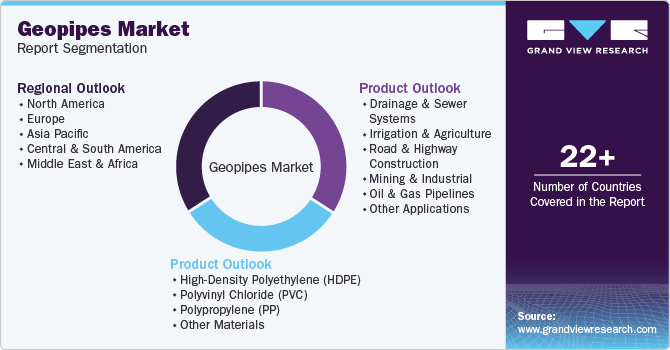
-
Product Outlook (Revenue, USD Million, 2018 - 2030)
-
High-Density Polyethylene (HDPE)
-
Polyvinyl Chloride (PVC)
-
Polypropylene (PP)
-
Other Materials
-
-
Application Outlook (Revenue, USD Million, 2018 - 2030)
-
Drainage & Sewer Systems
-
Irrigation & Agriculture
-
Road & Highway Construction
-
Mining & Industrial
-
Oil & Gas Pipelines
-
Other Applications
-
-
Regional Outlook (Revenue, USD Million, 2018 - 2030)
-
North America
-
U.S.
-
Canada
-
Mexico
-
-
Europe
-
Germany
-
UK
-
France
-
Italy
-
Spain
-
-
Asia Pacific
-
China
-
India
-
Japan
-
South Korea
-
-
Central & South America
-
Brazil
-
Argentina
-
-
Middle East & Africa
-
Frequently Asked Questions About This Report
b. The global geopipes market size was estimated at USD 2.21 billion in 2024 and is expected to reach USD 2.42 billion in 2025.
b. The global geopipes market is expected to grow at a compound annual growth rate of 9.6% from 2025 to 2030 to reach USD 3.82 billion by 2030.
b. The high-density polyethylene (HDPE) segment led the market and accounted for the largest revenue share of 60.69% in 2024, driven by its exceptional durability, resistance to corrosion, and cost-effectiveness in a wide range of applications.
b. Some of the key players operating in the geopipes market include Geosynthetics Limited, GSE Environmental, TenCate Geosynthetics, SKAPS Industries, HUESKER, Officine Maccaferri, ABG Ltd., Terram, Thrace Group, Ocean Global.
b. The key factors that are driving the geopipes market include increasing demand for efficient water management solutions, rapid infrastructure development, rising adoption of sustainable irrigation systems, advancements in geosynthetic materials, and government initiatives supporting modern agricultural practices.
Share this report with your colleague or friend.
Need a Tailored Report?
Customize this report to your needs — add regions, segments, or data points, with 20% free customization.

ISO 9001:2015 & 27001:2022 Certified
We are GDPR and CCPA compliant! Your transaction & personal information is safe and secure. For more details, please read our privacy policy.
Trusted market insights - try a free sample
See how our reports are structured and why industry leaders rely on Grand View Research. Get a free sample or ask us to tailor this report to your needs.










